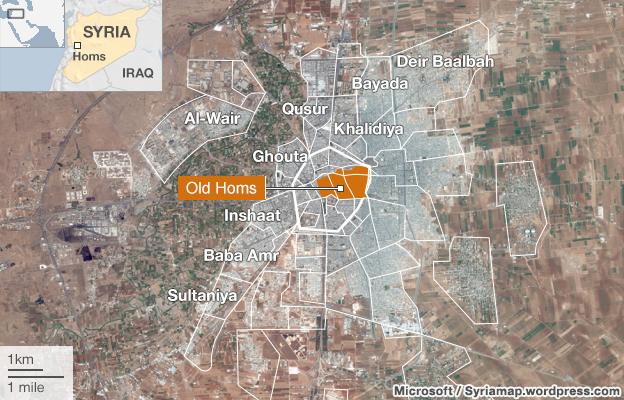Syria conflict: Aid and evacuations continue in Homs
- Published
Lyse Doucet reports from Homs where more than 1,000 civilians have been evacuated
The UN-backed evacuation of civilians and delivery of aid has continued at the besieged rebel-held Old City of Homs.
More than 200 civilians left, joining hundreds allowed out since the truce was agreed on Friday.
But concerns remain over the fate of men of military age who face questioning by the Syrian authorities.
Meanwhile, talks between the warring sides have continued in Geneva, with no sign of any breakthrough.
What was once a ballroom on the edge of Homs is being used to care for evacuees, as the BBC's Lyse Doucet reports
In other developments:
Syrian government forces and their Lebanese Shia ally Hezbollah have stepped up an assault on the strategic opposition-held town of Yabroud, near the Lebanese border, with at least 13 air strikes reported. Lebanese officials told the BBC dozens of families were streaming over the border in anticipation of a major assault
Syrian government and opposition delegations are holding a third day of talks in Geneva
A man thought to be the first Briton to have carried out a suicide bombing in Syria is named as Abdul Waheed Majid
Meanwhile sharp words have been exchanged by Washington and Moscow after Russia again objected to a draft UN Security Council resolution - this time, one that would call on all sides to allow aid workers access across Syria.
That was criticised by US President Barack Obama, external, who called Russia a "holdout" and suggested that by blocking the resolution it too was responsible for "starving civilians", along with Syria.
A Russian foreign ministry spokesman dismissed the criticism as a "biased distortion", highlighting Russia's role in helping achieve the ceasefire in Homs and insisting Russia was as concerned about the humanitarian situation in Syria as Washington.
But the BBC's Nick Bryant at the UN in New York says that although Russia has rejected this present draft, it has not slammed the door on an alternative resolution.
'Weeding out terrorists'
Government troops have besieged Homs for 18 months.
Evacuations over the weekend were facilitated by a three-day truce, which was then extended until Wednesday, though the relief operation was halted by a day on Tuesday due to logistical reasons.
Nearly 200 parcels containing flour, rice, vegetable oil and other foodstuffs were delivered on Wednesday.
The UN's local humanitarian co-ordinator, Yacoub El Hillo, and Homs Governor Talal Barazi said more than 200 civilians had been taken out of Homs in Wednesday's operation.
But hundreds of civilians remain trapped inside the Old City.
Mr Barazi said an extension to the current ceasefire, due to end late on Wednesday, could be agreed.
UN agencies have also expressed concern over the fate of dozens of men who were taken in by Syrian security personnel after they fled Homs.
Mr Barazi said 111 men had been questioned and released, while 190 others were still being held.
"I just want to say I hope that that the bigger percentage will all be released," he told the BBC.
"They are living in a shelter in very good conditions."
The Syrian authorities said the screening was necessary to weed out "terrorists".
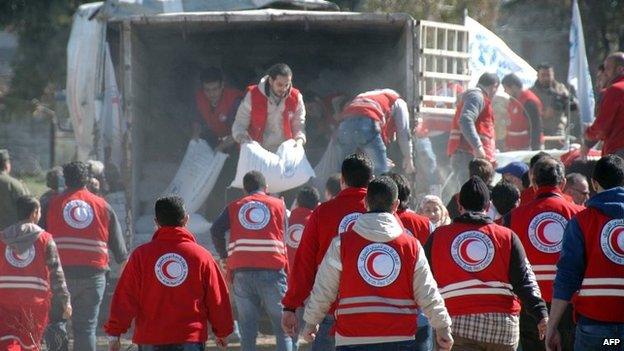
The UN delivered more food parcels to Homs - where residents have endured months with little food, some resorting to eating grass and shrubs
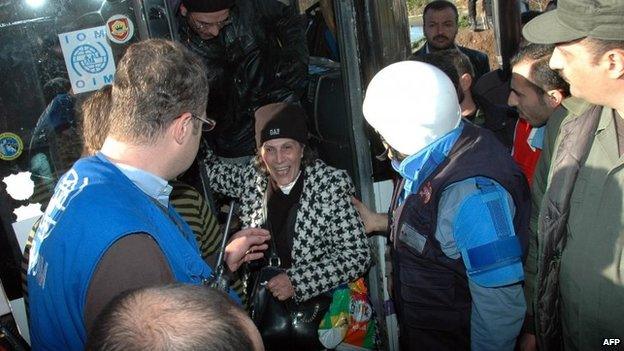
More than 200 people were evacuated on Wednesday
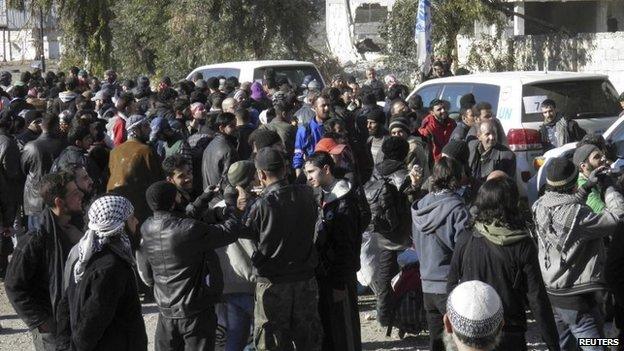
But hundreds more remain inside Homs - some gathered here and hoping to join those being evacuated
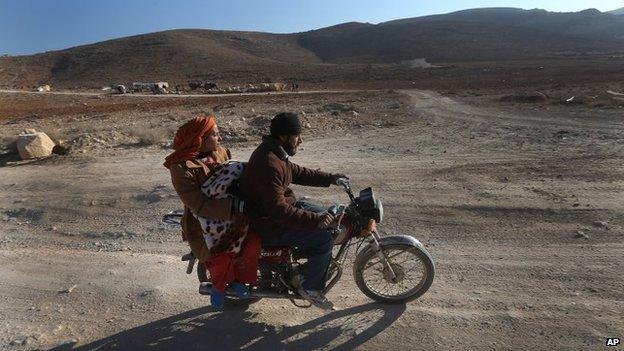
Despite the truce in Homs, the bombs continue to fall elsewhere - here, a family flees the rebel stronghold of Yabroud as it comes under attack from the combined forces of the regime and Hezbollah
In Geneva, Syrian government and opposition negotiators met face-to-face again on Wednesday.
The opposition proposed a transitional governing body, external (TGB) be set up to oversee a UN-monitored ceasefire across Syria and steer it out of the nearly three-year war.
It would expel all foreign fighters, allow full humanitarian access and achieve a political solution to the war.
But regime representatives refused to discuss the plan, saying it was broaching political questions prematurely, reported AFP news agency.
UN envoy Lakhdar Brahimi has lamented a lack of progress in the talks - bringing forward a meeting with Russian and US officials by one day to Thursday in an apparent attempt to get them to apply pressure to the opposed Syrian sides.
The first round of talks ended last month with no firm agreements and both sides trading insults.
Meanwhile, the bloodshed continues inside Syria, with the Syrian Observatory of Human Rights saying Syrians are being killed at a faster rate than ever.
The British-based group, which has links to the opposition, said at least 4,959 people had died in the three-week period since 22 January, when the first round of Swiss talks began.
The opposition wants the government to commit in writing to the 2012 Geneva Communique, external, which called for the formation of a transitional administration with full executive authority.
President Bashar al-Assad's government has ruled out any transfer of power.
The civil conflict has claimed more than 100,000 lives and has driven 9.5 million people from their homes.
